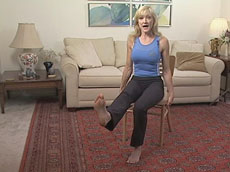Caregiving – Part 2Exercises for people with Alzheimer's and their caregiversMedical Alert devices for people with rare diseasesPowerful Patient 2008 Week 4Host: Joyce Graff, WebTalkRadio.net
Caring for someone with dementia is particularly difficult. Watching someone you love lose their power to reason is hard; it is even harder to be the person losing that power. Frustration mounts on both sides.
We speak with Mary Daley about the years she spent supporting her husband Brad through end-stage Alzheimer’s disease. While working with Brad, Mary undertook a project that helped to keep her strong. Through the telephone and internet she made connections and plans that resulted in the production of an exercise video for people with Alzheimer’s and their caregivers.
From the Mailbag, we received a question from Nicola of Durham: “I was toying with the idea of getting a medical bracelet but wasnt sure if it was worth doing. What kind of details would be best to put on it, as I would assume that just putting von Hippel-Lindau would mean nothing to emergency workers.”
We speak with a paramedic about what an emergency worker needs to know, and how to distill the essence of a hefty medical history into the quick handoff needed at the scene of an accident, or when emergency workers arrive at your home.
Our Guests
Little by little, the level of care required of Mary progressed from Level 1 to Level 5. In this program Mary shares the story of their journey together along this difficult path. While it was certainly a burdensome problem, Mary is glad that she was able to care for Brad at home, as he wished.
In an effort to find a way to communicate with him and help him retain as much function as possible, she and her daughter Lynn devised an exercise program for patients and their caregivers. The benefits for caregivers are at least as important as the benefits for the patient. It is important for the caregiver to take care of him or herself, stay healthy, and keep a positive attitude. Exercise is beneficial for mild depression, which can go with being a Level 4 or 5 caregiver for a sustained period of time.
Rod helps us understand what information is really needed by an emergency worker in the field, where they are likely to look, and how to connect emergency workers and emergency room personnel with the key information from your medical history. Medical alert bracelets are still the most widely recognized device you can carry with you. There are techniques for using that bracelet to refer to more information when you reach the emergency room.
More About YourXercise
To obtain a copy of Mary Daley’s DVD, please see
Scientific studies show that exercise can delay symptoms of Alzheimer’s. This program was designed for people who can no longer run, jump, or walk long distances. A great activity for both Caregiver and Patient!
More about Medical Alert Devices
Rod Brouhard has a very informative discussion of medical alert devices at http://firstaid.about.com/od/emergencypreparation/tp/informatics.htm “ Seven Ways to Organize Medical Information”
He advises working with your doctor to compile a one-page “history and physical assessment” to be passed to another medical professional. This is the normal quick handoff information that doctors routinely pass to one another, so it will make sense to your physician to compile such a document with two possible scenarios in mind:
For example, some first aid practices must be modified for patients of chronic medical conditions. Medications, blood clotting disorders, decreased pain tolerance, and chronic dehydration all complicate attempts to render first aid to those with chronic illness. See Rod’s article at:
The bracelet might refer people to a service, device, or file of information in your home. This gives you the opportunity to deposit additional information, which might include:
|

 Mary Daley of Decatur, Georgia (near Atlanta), has become a spokesperson for Alzheimer’s and for caregiving. Mary and Brad Daley were married for 58 years. For the last five of those years, Brad was diagnosed with Alzheimer’s disease, which slowly robbed him of his considerable brain power, and eroded his functions.
Mary Daley of Decatur, Georgia (near Atlanta), has become a spokesperson for Alzheimer’s and for caregiving. Mary and Brad Daley were married for 58 years. For the last five of those years, Brad was diagnosed with Alzheimer’s disease, which slowly robbed him of his considerable brain power, and eroded his functions. Rod Brouhard is the Guide to First Aid at about.com, which is owned by the New York Times. He is a full-time paramedic, serving on an ambulance in Northern California. He writes a column for about.com, and articles for a number of magazines.
Rod Brouhard is the Guide to First Aid at about.com, which is owned by the New York Times. He is a full-time paramedic, serving on an ambulance in Northern California. He writes a column for about.com, and articles for a number of magazines.